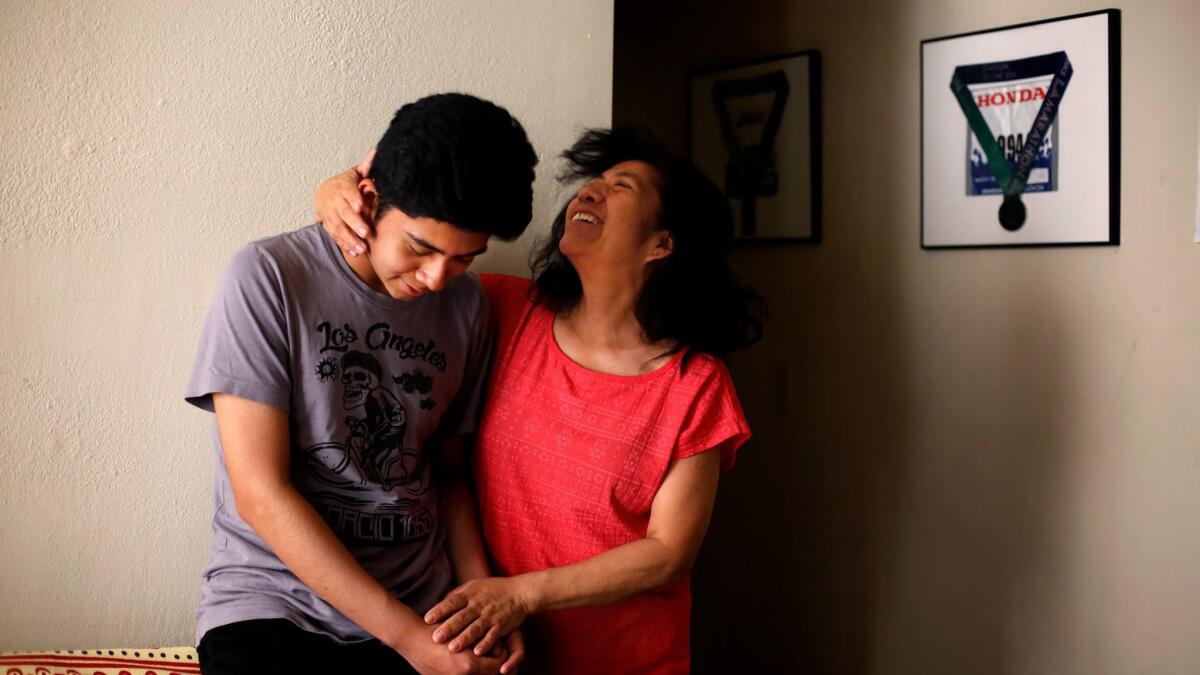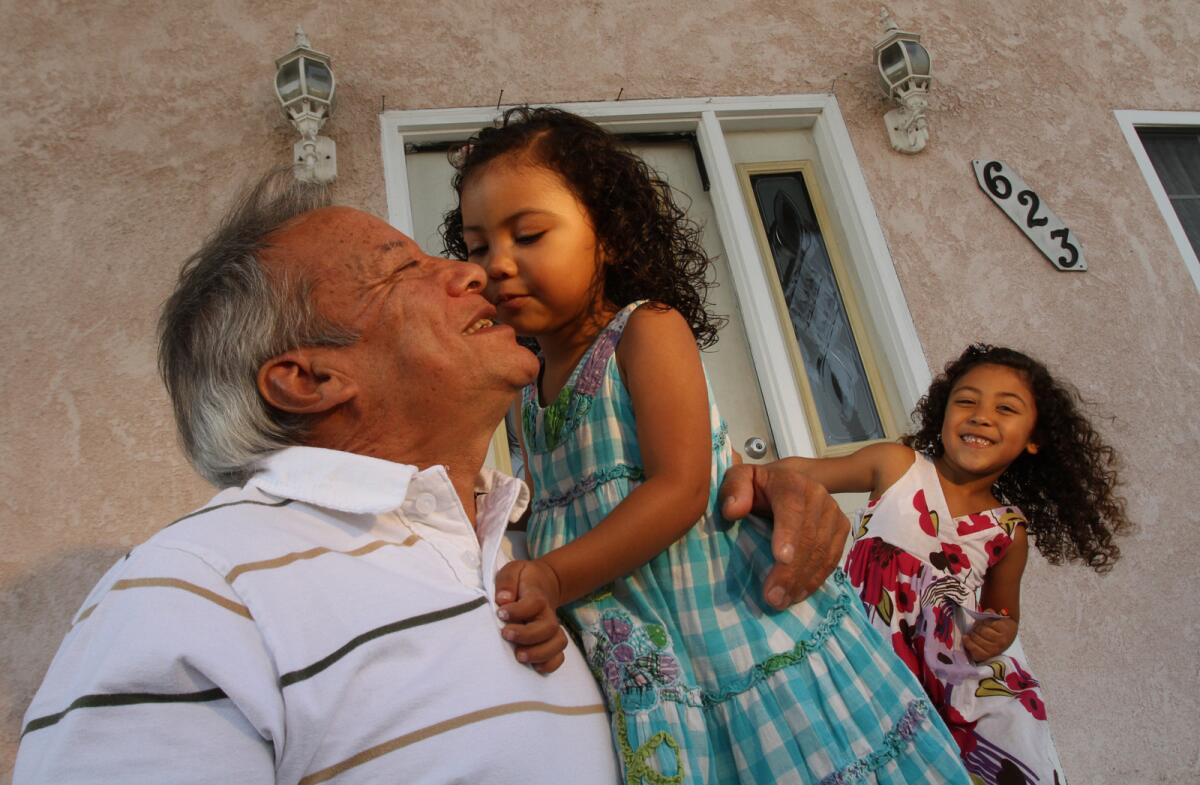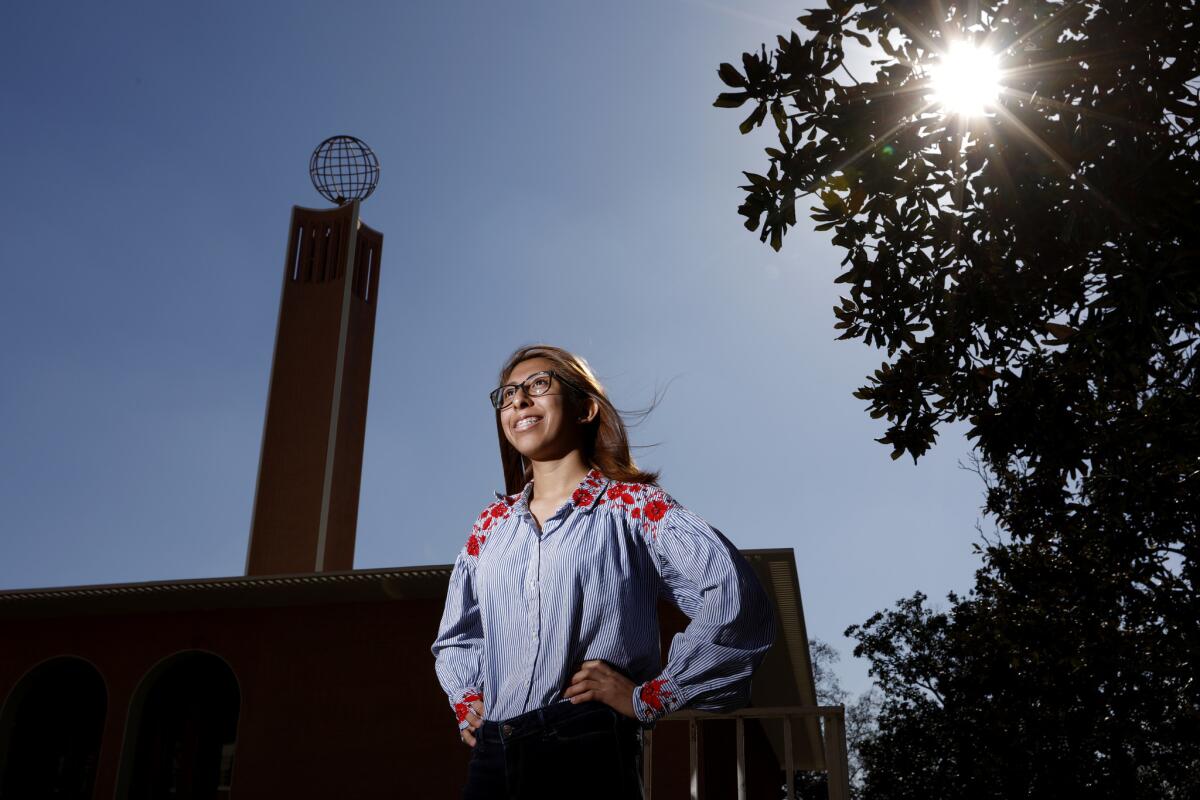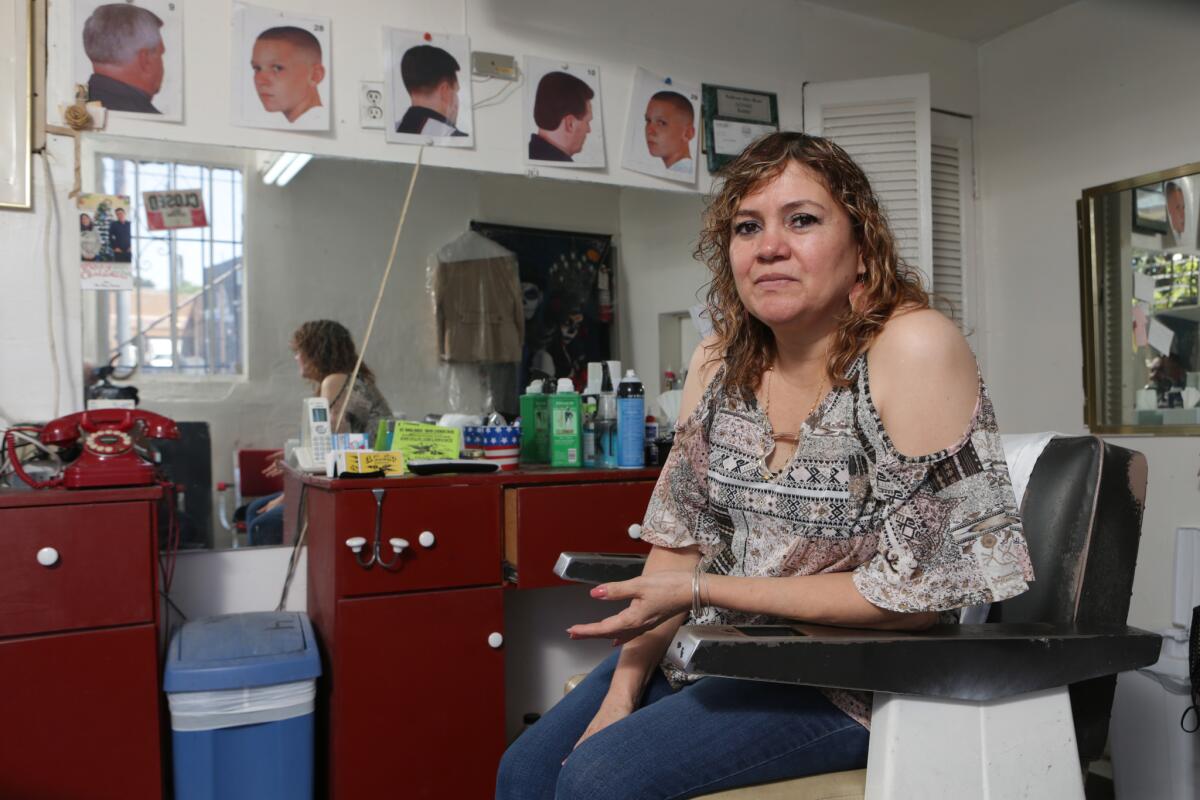Column: I’ve got some immigrants I’d like Donald Trump to meet

This is a big week for Ozzie Vazquez, the young whiz kid and Chinatown resident who hit the books hard in both Mexico and Los Angeles. He is packing for college.
“I leave Thursday,” said Ozzie, whose many years of hard work got him into Harvard. “It’s going to be tough to leave family behind, but yeah, I’m excited.”
In Torrance, meanwhile, construction worker Fidel Lopez, an immigrant from Guatemala, is keeping to his usual schedule, even though he’s now 73. When I called Monday morning, his wife, Coralia, told me Fidel was at an apartment building where he was working as a fix-it guy.
I wrote about Lopez in 2012, on the 20th anniversary of the riots that followed the verdict in the Rodney King beating. Lopez was in the worst place at the worst time, in South L.A. on the way home from work, when he was dragged out of his truck and savagely beaten.
You may recall the horrifying video. Fidel was kicked, doused with gasoline and smashed in the head with a stereo. His tools were stolen and his truck set ablaze. A minister, Bennie Newton, saved his life when he rushed to Fidel’s attackers and told them, “Kill him, and you have to kill me, too.”

Fidel’s recovery from serious injuries took years. He’s slowed down a bit lately, said Coralia, but there are still bills to pay, and he refuses to admit he’s lost a step.
“He’s not the same,” said Coralia, “but I see the typical macho man saying, ‘No, I’m OK.’”
Speaking of that mentality, Ray the gardener is still on the job almost 14 years after being rushed to the emergency room at UCLA. He’d been landscaping a yard in Inglewood when approached by someone demanding money. Ray resisted and got shot.
Doctors couldn’t remove the bullet from Ray’s chest because of its location. They wanted him to stay in the hospital for observation, but Ray insisted on leaving and returning to work. It was Dec. 23, 2005, the landscaping job was a surprise present, and Ray, who came to the U.S. from Mexico, had promised his client he would be done before Christmas.
“I’m on my lunch break,” Ray told me Tuesday afternoon from Manhattan Beach, where he was finishing up a gardening job. He said he still has the bullet in his chest, but feels fine, and business is good.
Get up to date on the latest immigration news, policy changes and other developments out of LA, California, and around the world.
So why am I revisiting these people I’ve written about over the years?
Because they’re the kind of immigrants and descendants of immigrants, legal and illegal, you rarely hear about from President Trump, who spews a lot of bile about an invasion of people here to take, not contribute.
From him, its starting to feel as if anyone with brown skin is suspect, and people told me they feel that way whether they’re here legally or not. He rants about criminals swarming across the border and about cultural change and stolen jobs and depressed salaries, all of it boiling down to “us” versus “them.”
“I think our current administration forgets the basic values of humanism,” said Ozzie, “and takes the route of tribalism.”
Horrible stories about immigrants — like the one this week about an MS-13 gang member charged with heinous crimes while posing as a crime reduction counselor in the San Fernando Valley — fuel the fire.
Those stories are real, but statistically rare.

For me, the true story of Los Angeles is people like USC senior Miriam Antonio, born in Los Angeles to immigrant parents, who was busy at her United Way summer job, where she works on solutions to homelessness. Miriam is the story the xenophobes can’t acknowledge.
I met her at a forum for school board candidates when she was in high school. She ran a voter registration drive at Fairfax High. She worked, she helped take care of her siblings because her immigrant mother worked a graveyard shift as a janitor, and her family shared a two-bedroom apartment with another family.
After college, Miriam plans to go to law school.
“I don’t think racism ever fully goes away,” she said when I checked in on her this week. Miriam, who volunteers at a USC law school project that assists asylum seekers, said she sees a constant “struggle, a tug of war, between different ideologies. After Trump won, he empowered supporters to come out and be freely outspoken about how they feel about certain groups of people.”
Cecilia Rios, born in Mexico as was her father, inherited the Echo Park Barber Shop from him and still runs it. When I visited Monday, one customer after another squeezed into the tiny shop, where a haircut is still $10. Cecilia told me she and her husband still live in the one-bedroom, $800-a-month apartment where they raised four children.

Rios still takes donations of clothing from customers and others, and when she can’t give it all away to needy families here, she takes a bus to a Mexican orphanage and makes a donation.
“Trump’s mother and wife are immigrants,” Rios said, and that, to her, speaks to a level of hypocrisy.
Rios said she has family in El Paso, where a white supremacist with a manifesto that sounded too much like a Trump campaign speech went gunning for “Mexicans” earlier this month and massacred 22 people. She was still shaking when she told me none of her relatives were among the victims.
When I wrote about Julio Ruiz two years ago, the Compton resident was flipping houses in South Los Angeles. When I reached him Monday, he said he’d become a developer and was working on a project on South Vermont. He said nothing about Trump’s rhetoric surprises him.
“Ever since he came in, whether it was with Muslims or the Pocahontas comments or calling us racists — and it was worse with black people before he was president — it’s in his DNA. It’s in his moral fiber,” said Ruiz.
Ruiz said his own parents, who came from Mexico, were granted amnesty by President Ronald Reagan, which speaks to the sharp turn on hostility toward immigrants.
“I had a nightmare last night,” said Ruiz, who is a U.S. citizen. “I was in jail, separated from my children. I can remember deep sadness. Just sobbing and a complete wreck … I can’t imagine what these migrant parents and children are feeling …. It’s a low point in humanity, not just U.S. history.”
As I research the immigration of my own grandparents, from Spain and Italy, it’s not yet clear to me whether all of them became citizens. But regardless, they became Americans and had a singular objective — a better life for themselves and their children.
I don’t have a problem with deporting violent offenders, nor do I question the need for border security.
But as I drop in and out of the lives of all the immigrants and their families I’ve had the privilege of knowing — by the hundreds — I don’t see a threat to American values and well-being.
I see people going to school and to work, struggling, prospering, despairing, dreaming.
I see Fidel Lopez in his “Old Glory” T-shirt with construction dust on his hands. I see Ray the gardener hustling jobs. I see Cecilia running a business and raising a family while looking out for those less fortunate than she.
I see Ozzie’s mother, Eva, at her discount store job moments after Ozzie called with the news of his college admission. She was in tears, and a security guard asked why.
“Do you really want to know?” said Eva. “My son got into Harvard.”
More to Read
Sign up for Essential California
The most important California stories and recommendations in your inbox every morning.
You may occasionally receive promotional content from the Los Angeles Times.











